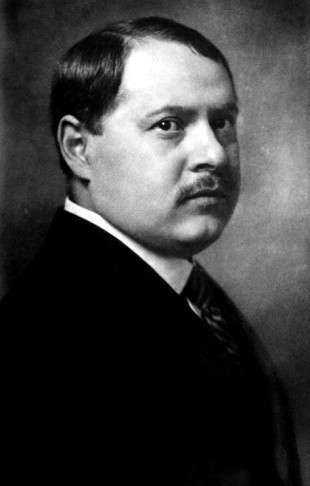Kurt Gänzl
The Encyclopedia of the Musical Theatre
22 September, 2015
Produced in Budapest during the most fecund period in Hungarian operetta, Albert Szirmai’s 1916 wartime piece Mágnás Miska (Miska the magnate) stands alongside such pieces as Jacobi’s Leányvásár and Szibill as one of the most successful products of its time and place. It has a book by Károly Bakonyi, lyrics by Andor Gábor. With a score by Albert Szirmai the three-act operetta premiered at the Király Színház, Budapest, 12 February 1916.

Composer Albert Szirmai.
During a sporty country-house weekend at the house of Count Kasimir Korlath (Kálmán Latabár), his daughter, Rolla (Juci Lábass), falls for the untitled Iván Baracs (Ernö Király) whose athletic prowesses have won him every event. Rolla’s brother Gida (Ernö Szabolcs) and the other losers get it whispered about that she is simply leading the bourgeois fellow on, and in revenge Baracs introduces his groom, Miska (Márton Rátkai), to the dazzled aristocrats as the lofty Gróf Amadée, just returned from darkest Africa. But Rolla, who is wise to his trick, in turn disguises her kitchen-maid, Marcsa (Sári Fedák), as Amadée’s cousin, the Countess Lizzi. The antics of the two disguised `aristocrats’ and the clearing of a path towards both their union and that of Rolla and Baracs comprise the action of the second and third acts.

Poster for the 1916 film version of “Mágnás Miska.”
A great success in Budapest, Mágnás Miska passed its 150th performance at the Király Színház just eight months after its première, and was long regularly revived in Hungary, most recently at the Fövárosi Operettszinház in 1972 (27 October). The show was also briskly picked up for a German presentation (ad Robert Bodanzky) which ran through almost three months of performances at Berlin’s Komische Oper, and this version was later played at Vienna’s Apollotheater with Fedák repeating her original rôle (now called Rosi) alongside Josef König, Olga Bartos-Trau and Oskar Neruda. It apparently went no further west, but in Hungary it wins regular revivals.
Germany: Komische Oper Der Pusztakavalier 16 November 1916; Austria: Apollotheater Der Pusztakavalier November 1920; Film: 1948
